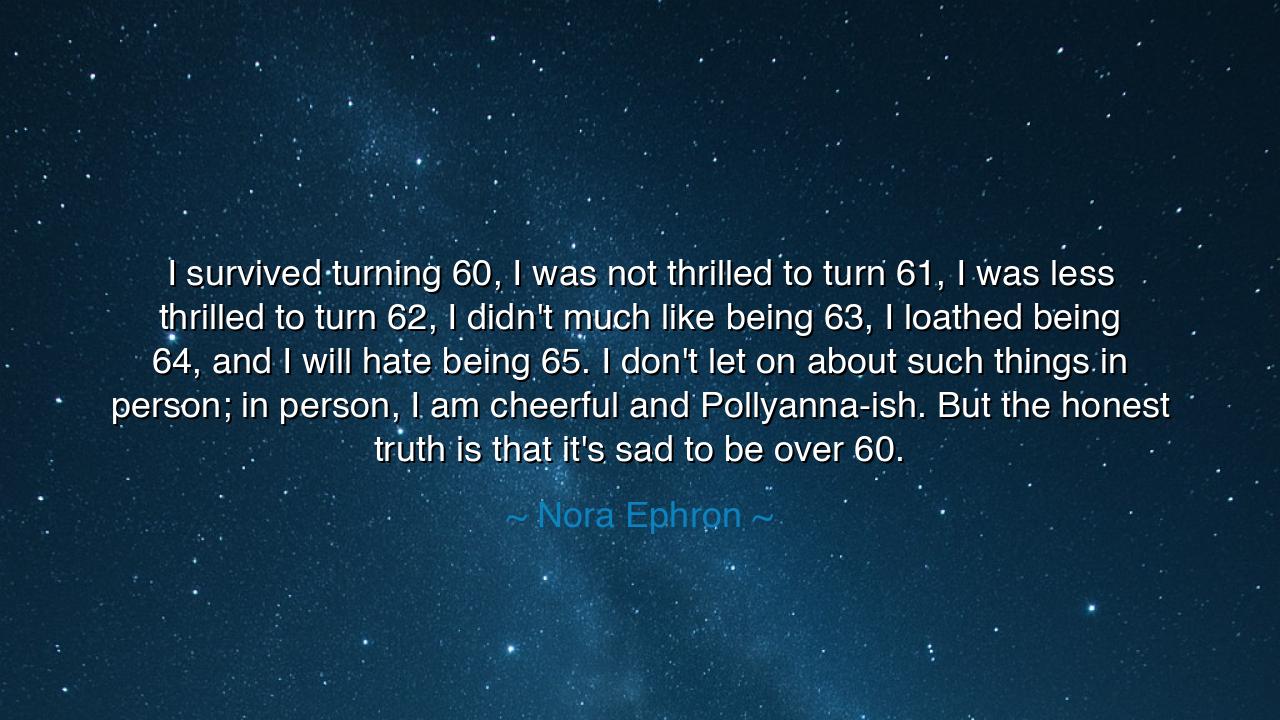
I survived turning 60, I was not thrilled to turn 61, I was less
I survived turning 60, I was not thrilled to turn 61, I was less thrilled to turn 62, I didn't much like being 63, I loathed being 64, and I will hate being 65. I don't let on about such things in person; in person, I am cheerful and Pollyanna-ish. But the honest truth is that it's sad to be over 60.






The words of Nora Ephron, spoken with her characteristic blend of wit and candor, pierce like a truth too often left unspoken: “I survived turning 60, I was not thrilled to turn 61, I was less thrilled to turn 62, I didn't much like being 63, I loathed being 64, and I will hate being 65… the honest truth is that it's sad to be over 60.” Beneath the humor lies a profound meditation on the inevitability of age, the fading of vitality, and the tension between how we present ourselves to others and what we feel in the privacy of our own hearts.
The origin of this lament comes from Ephron’s reflections in her later years, captured in essays where she confronted the realities of aging with the same sharp eye she once turned on love, marriage, and modern life. Unlike those who veil the sorrow of growing older in silence, she spoke it plainly, almost defiantly. The succession of years—60, 61, 62, 63, 64, and beyond—becomes in her telling a drumbeat of decline, each one greeted with less joy, each one a reminder that time moves in only one direction.
And yet, there is also courage in this confession. For Ephron admits that in person she is cheerful and Pollyanna-ish, wearing the mask of optimism so that others might not see the ache beneath. This duality—the bright exterior and the shadowed interior—is as old as humanity. The ancients spoke of actors upon the stage wearing masks: one smiling, one weeping. Ephron, in her honesty, reminds us that many who smile before the world conceal grief in the soul. To name this truth is to give voice to what countless elders feel but dare not say.
History offers us many parallels. Consider Cicero, the Roman statesman, who in his essay On Old Age sought to console himself and others with the virtues of wisdom and moderation that come with years. Yet even he, who praised the ripening of the soul, confessed the pain of declining strength, of losing friends, of seeing death approach. The honesty of Ephron is the same: the recognition that age may bring perspective, but it also brings loss—loss of youth, loss of possibility, loss of time.
Her words also reveal the human struggle between acceptance and resistance. Some embrace old age with serenity, others fight against it with denial, but Ephron does neither. She stands in the middle ground: honest about the sorrow, yet still capable of laughter; unwilling to lie to herself, yet unwilling to abandon cheer for others. This balance is a kind of wisdom, for it allows both truth and hope to coexist, even if uneasily.
The lesson here is profound: we must prepare the soul for aging with honesty, compassion, and grace. To deny sorrow is to be dishonest; to be consumed by it is to despair. Instead, like Ephron, we must learn to name the sadness, to confess the grief, and yet continue to live with humor and kindness. In so doing, we not only free ourselves, but also give permission to others to speak their hidden truths.
Practically, this means we must learn to treat the aging—with all their fears and complaints—not with dismissal, but with empathy. We must honor their voices when they confess what the world prefers to ignore. And in our own lives, we must cultivate practices of gratitude and meaning, so that when the years advance, we are not only mourning what has been lost but also cherishing what remains. Friendships, art, stories, wisdom—these are the treasures of age, and they can outshine the fading of the body if we learn to see them clearly.
Thus, the words of Nora Ephron become more than lament; they become a torch of honesty passed down. To age is to grieve, but also to teach. To admit sorrow is not weakness, but courage. And to laugh, even while confessing sadness, is to triumph over despair. This is the teaching we inherit from her: that though the years bring loss, they can also bring the deepest truths—and it is better to speak them than to hide them in silence.






AAdministratorAdministrator
Welcome, honored guests. Please leave a comment, we will respond soon